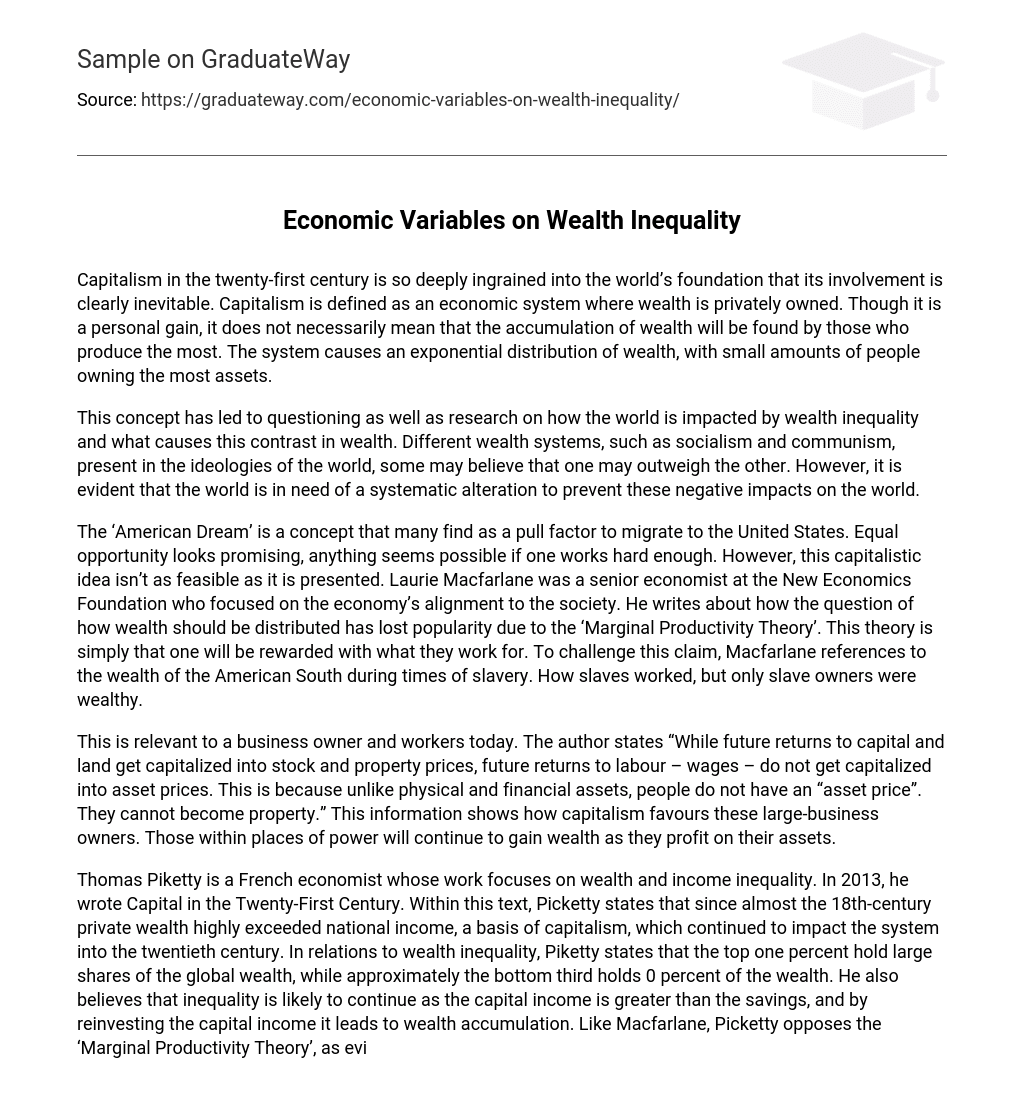Capitalism in the twenty-first century is so deeply ingrained into the world’s foundation that its involvement is clearly inevitable. Capitalism is defined as an economic system where wealth is privately owned. Though it is a personal gain, it does not necessarily mean that the accumulation of wealth will be found by those who produce the most. The system causes an exponential distribution of wealth, with small amounts of people owning the most assets.
This concept has led to questioning as well as research on how the world is impacted by wealth inequality and what causes this contrast in wealth. Different wealth systems, such as socialism and communism, present in the ideologies of the world, some may believe that one may outweigh the other. However, it is evident that the world is in need of a systematic alteration to prevent these negative impacts on the world.
The ‘American Dream’ is a concept that many find as a pull factor to migrate to the United States. Equal opportunity looks promising, anything seems possible if one works hard enough. However, this capitalistic idea isn’t as feasible as it is presented. Laurie Macfarlane was a senior economist at the New Economics Foundation who focused on the economy’s alignment to the society. He writes about how the question of how wealth should be distributed has lost popularity due to the ‘Marginal Productivity Theory’. This theory is simply that one will be rewarded with what they work for. To challenge this claim, Macfarlane references to the wealth of the American South during times of slavery. How slaves worked, but only slave owners were wealthy.
This is relevant to a business owner and workers today. The author states “While future returns to capital and land get capitalized into stock and property prices, future returns to labour – wages – do not get capitalized into asset prices. This is because unlike physical and financial assets, people do not have an “asset price”. They cannot become property.” This information shows how capitalism favours these large-business owners. Those within places of power will continue to gain wealth as they profit on their assets.
Thomas Piketty is a French economist whose work focuses on wealth and income inequality. In 2013, he wrote Capital in the Twenty-First Century. Within this text, Picketty states that since almost the 18th-century private wealth highly exceeded national income, a basis of capitalism, which continued to impact the system into the twentieth century. In relations to wealth inequality, Piketty states that the top one percent hold large shares of the global wealth, while approximately the bottom third holds 0 percent of the wealth. He also believes that inequality is likely to continue as the capital income is greater than the savings, and by reinvesting the capital income it leads to wealth accumulation. Like Macfarlane, Picketty opposes the ‘Marginal Productivity Theory’, as evidence is clear on how the richer will continue to become richer while the poor will stay poor due to their large claim of assets.
Jason Hickle, just like the other the other authors, has researched on how wealth inequality impacts the world. As a student of London School of Economics, the University of Virginia, and Goldsmiths, the University of London, where he convenes the MA in Anthropology and Cultural Politics, Hickle is well versed in economics and world issues. He also serves on the Labour Party task force on international development, works as Policy Director for The Rules collective, sits on the Executive Board of Academics Stand Against Poverty (ASAP). He stated in his video that “about 4 billion people survive on 5 dollars a day.” This is mostly relevant to third world countries that are being profited from. These periphery countries are constantly being used by core countries to find cheap labour and production with fewer regulations. (find stats and source)
The distribution of wealth is more unequal now than it has been in the past 30 years. Nadia Karamcheva is a member of the Congressional Budget Office who, by the assistance of her fellow members of Congress, wrote the report “Trends in Family Wealth, 1989 to 2013”. The purpose of the report is to provide an examination of how wealth trends changed within those twenty-four years. In the report, the author states that “In 2013, families in the top 10 percent of the wealth distribution held 76 percent of all family wealth, families in the 51st to the 90th percentiles held 23 percent, and those in the bottom half of the distribution held 1 percent.”
This information only begins to describe the severity of the distribution of wealth. Since 1989, the 90th percentiles have increased in wealth by 9% while bottom half decreased by 2%. This may be due to the aforementioned bias toward wealthy individuals entwined in the capitalist economies. Meanwhile, in a report conducted in 2017, US Census Bureau also found the changes of income between 2016 and 2017 finding that the 50th, 80th, 90th, and 95th percentiles increased 1.8 percent, 2.6 percent, 2.8 percent, and 3.0 percent, respectively, while changes in income at the other percentiles were not statistically significant.
Works Cited
- Karamcheva, Nadia. “Trends in Family Wealth, 1989 to 2013.” Congressional Budget Office, 18 Aug. 2016, www.cbo.gov/publication/51846.
- Macfarlane, Laurie. “Why the Distribution of Wealth Has More to Do with Power than Productivity.” Resilience, 1 Oct. 2018, www.resilience.org/stories/2018-10-01/why-the-distribution-of-wealth-has-more-to-do-with-power-than-productivity/.
- Piketty, Thomas. Capital in the Twenty – First Century Thomas Piketty ; Translated by Arthur Goldhammer. London, 2014.
- UK, Penguin Books and Jason Hickle, directors. The Divide: Global Wealth Inequality Explained | Dr Jason Hickel. YouTube, YouTube, 17 May 2018, www.youtube.com/watch?v=ZUlOzcQIZp0.
- US Census Bureau. “Income and Poverty in the United States: 2017.” Census Bureau QuickFacts, United States Census Bureau, 12 Sept. 2018, www.census.gov/library/publications/2018/demo/p60-263.html.
- US Census Bureau. “Where the Wealth Is: The Geographic Distribution of Wealth in the United States.” Census Bureau QuickFacts, United States Census Bureau, 27 Apr. 2017, www.census.gov/library/working-papers/2017/demo/FY2016-129.html.
- “Wealth Inequality.” Inequality.org, inequality.org/facts/wealth-inequality/.





